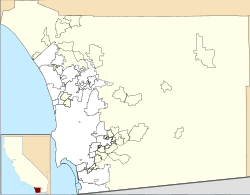Presidio of San Diego
|
San Diego Presidio
|
|

1820 map, Presidio of San Diego
|
|
| Location | San Diego, California |
|---|---|
| Coordinates | 32°45′31″N 117°11′36″W / 32.75861°N 117.19333°WCoordinates: 32°45′31″N 117°11′36″W / 32.75861°N 117.19333°W |
| Built | 1769 |
| NRHP Reference # | 66000226 |
| CHISL # | 59 |
| SDHL # | 4 |
| Significant dates | |
| Added to NRHP | October 15, 1966 |
| Designated NHL | October 9, 1960 |
| Designated CHISL | 1932 |
| Designated SDHL | February 29, 1968 |
El Presidio Reál de San Diego (Royal Presidio of San Diego) is a historic fort in San Diego, California. It was established on May 14, 1769, by Gaspar de Portolá, leader of the first European land exploration of Alta California - at that time an unexplored northwestern frontier area of New Spain. The presidio was the first permanent European settlement on the Pacific Coast of the present-day United States. As the first of the presidios and Spanish missions in California, it was the base of operations for the Spanish colonization of California. The associated Mission San Diego de Alcalá later moved a few miles away.
Essentially abandoned by 1835, the site of the original Presidio lies on a hill within present-day Presidio Park, although no historic structures remain. The San Diego Presidio was registered as a California Historical Landmark in 1932, then declared a National Historic Landmark in 1960.
Prior to occupation by the Spanish, the site of the Presidio was home to the Kumeyaay people (called the Diegueños by the Spaniards).
The first Europeans to explore San Diego Bay and its environs were members of the maritime expedition led by Juan Rodríguez Cabrillo in 1542. Sebastián Vizcaíno visited again in 1602, but no settlement was made until the fort was begun in May 1769. Later that year, on July 16, 1769, Mission San Diego de Alcalá was established by Junípero Serra on Presidio Hill. The presidio had a commanding view of San Diego Bay and the Pacific Ocean, allowing the Spanish to see potential intruders.
...
Wikipedia



